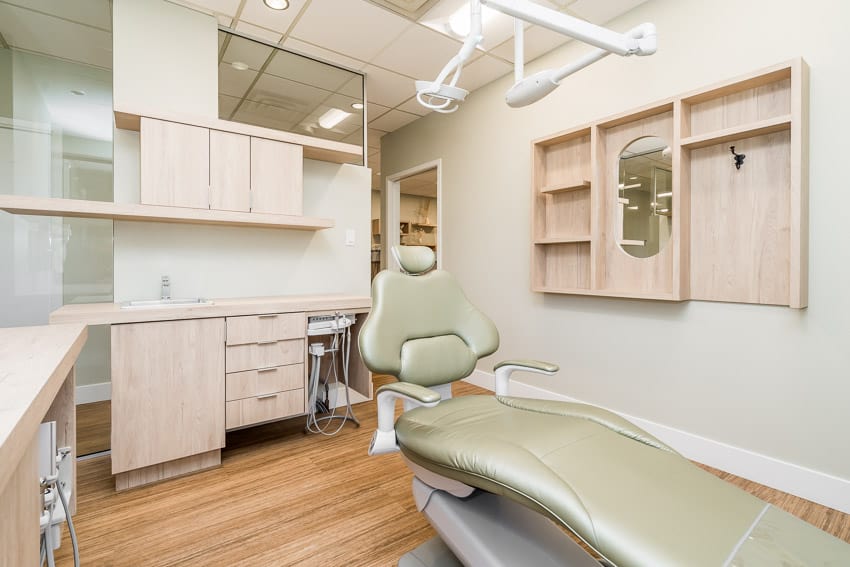Wisdom Teeth Removal in Delta, BC

What Are Wisdom Teeth?
Wisdom teeth are the final set of molars that typically emerge during the late teens or early twenties. While most people have four, it’s possible to have fewer or none at all. These teeth are located at the back of the mouth, both on the top and bottom.
In ancient times, humans needed these extra teeth to chew tough, raw foods. Although modern diets have softened, our bodies continue to grow wisdom teeth. Unfortunately, due to changes in jaw size over time, these teeth often cause more harm than good.
Why Remove Wisdom Teeth?
Many people face complications as their wisdom teeth grow. Some people have enough space in their mouths for wisdom teeth to grow normally. Others may face issues that require wisdom tooth removal. Here are a few common reasons why removal is recommended:
- Preventing Future Problems: Removing wisdom teeth early can prevent complications like infections and discomfort as the roots are not fully developed.
- Difficulty Cleaning: Wisdom teeth are difficult to reach, making proper cleaning tough. This can lead to tooth decay, gum disease, and the need for further dental treatments.
- Impacted Wisdom Teeth: Some wisdom teeth become impacted in the jawbone, leading to pain, swelling, and infection.
- Crowding: If there isn’t enough space, wisdom teeth can crowd adjacent teeth, causing misalignment.
- Cysts: Fluid-filled cysts may develop around impacted teeth, damaging nearby bones and teeth.
Wisdom Teeth Removal Process at Tsawwassen Family Dental
At Tsawwassen Family Dental, we begin with a comprehensive evaluation of your oral health. Our dentist will take x-rays to assess the position of your wisdom teeth and decide if extraction is necessary. If wisdom teeth are fully erupted, the procedure is straightforward and similar to other tooth extractions.
For impacted teeth embedded in the jawbone, a more complex surgery is required. In these cases, the dentist may make a small incision in the gums and remove part of the jawbone to access the tooth. At times, the tooth is taken out in sections to minimize the removal of bone.
We ensure comfort during the procedure by using local anesthesia combined with oral sedation. After the wisdom tooth extraction, the gums are sutured, and gauze is applied to control bleeding. You will receive thorough post-operative instructions before heading home.

Wisdom Teeth Removal Recovery
Recovering from wisdom tooth surgery usually takes a few days, but it can vary based on the individual. Here’s what you can expect during your recovery process:
- Bleeding: Some bleeding is normal within the first 24 hours, but blood clots will form to stop it.
- Swelling: You may experience swelling in the mouth and cheeks, along with jaw stiffness, which generally subsides within a week.
- Diet: Stick to soft foods such as mashed potatoes, soups, and yogurt while avoiding hard or chewy foods until your mouth is fully healed.
- Cleaning: Rinse your mouth gently with warm salt water to maintain cleanliness. An antiseptic mouthwash may also be recommended for additional protection.
Your wisdom tooth extraction dentist will give you personalized recovery guidelines to ensure smooth healing.
Common Complications of Wisdom Teeth Removal
Although wisdom tooth removal is safe, there are a few potential risks:
- Paresthesia: Temporary or permanent numbness in the lips, tongue, or cheeks can occur due to nerve bruising during the extraction.
- Dry Socket: A painful condition where the blood clot in the socket dislodges, delaying healing. This is more common among women taking birth control pills. Scheduling the procedure towards the end of your menstrual cycle can help lower the risk.
- Anesthesia Risks: General anesthesia comes with certain risks, though most patients benefit from local anesthesia for a less invasive experience. Your dentist removal of wisdom teeth will explain the anesthesia options and recommend the safest choice for you.
FAQ About Wisdom Teeth Removal
- How Long Does It Take to Recover From Wisdom Teeth Removal?
Most individuals recover fully within 3 to 7 days, though it can take longer in some cases. Swelling and discomfort typically peak by day three and gradually subside. - Is Wisdom Teeth Removal Painful?
With local anesthesia and sedation, you should not experience pain during the extraction. Some discomfort is expected during recovery, and your dentist will provide pain management options. - What Can I Eat After Wisdom Teeth Surgery?
Stick to soft foods like soups, smoothies, yogurt, and mashed potatoes. Avoid hard or crunchy foods that can irritate the area and disrupt the healing process. - How Can I Prevent Dry Socket?
Avoid using straws, smoking, and eating hard or crunchy foods in the days following surgery, as these actions may dislodge the protective blood clot in the socket. - When Can I Return to Work or School?
Most patients can return to normal activities within a few days, but you should avoid strenuous activities for at least a week to prevent complications.
By taking these steps and following your dentist’s guidance, your wisdom teeth removal healing process should go smoothly, ensuring a healthy smile for years to come.
Appointments

